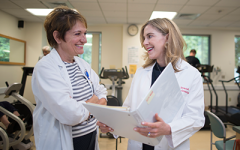Celebrating Heart Health Month
Find your care
The UCLA cardiovascular team cares for all types of heart and vascular conditions. Call 310-825-9011 to connect with a cardiovascular customer care specialist.
Heart disease is the leading cause of death for both men and women in the United States. The good news? It is also one of the most preventable.
Making heart-healthy choices, knowing your family health history and the risk factors for heart disease, having regular check-ups and working with your physician to manage your health are all integral aspects of saving lives from this often silent killer.

Cardiovascular Research: UCLA’s Leaders in the Field
At UCLA, our 160 cardiovascular research laboratories, working together with teams of physicians and health care professionals are united in a mission to understand the roots of this complex disease. We are designing therapies and interventions that do not just prevent heart disease but effectively treat it.
Together, they are focusing on the following key areas:
- Precision Medicine
- Scarless healing after heart attack
- Arrhythmia and sudden cardiac death
- Vascular health and disease

Heart Failure Discussion with Queen Latifah
Queen Latifah joined a special discussion with Queen Latifah, Karol Watson, MD, the American Heart Association and Sharecare to educate the public on living with heart failure. Latifah's mother suffers from the condition. Watch the interview
Heart Healthy Stories
Daily aspirin no longer recommended to prevent heart disease
Aspirin may be only ‘minimally beneficial’ and comes with an increased risk of digestive tract bleeding, says UCLA Health cardiologist Dr. Boback Ziaeian ... read article
Army dad meets baby daughter for first time, 2 days before her heart surgery
3D model of heart helped doctors prepare for intricate procedure ... read article
High blood pressure linked to working longer hours
Research has shown that people who put in long work hours can be at higher risk of developing high blood pressure than those who work shorter hours ... read article
UCLA experts discuss women’s heart health and managing risk factors
Heart disease is the leading cause of death in the U.S. for men and women. ... read article
IMST breathing exercises can help lower blood pressure
Strengthening your muscles used in breathing can have a healthy effect on your whole body ... read article
Heart Health Webinars
Aortic Stenosis: Future is Now!
UCLA interventional cardiologist Olcay Aksoy, MD, FACC, discusses how transcatheter aortic valve replacement (TAVR) has revolutionized the treatment of patients with aortic stenosis. Watch webinar
Latest Treatments and Advancements for Adult Congenital Heart Disease
UCLA cardiologist Jamil Aboulhosn, MD, discusses the prevalence and impact of congenital heart disease (heart disease from birth). He will also discuss some of the surgical and medical advances that have facilitated improvements in survival and quality of life for this population. Watch webinar
Gender Matters: Heart Disease in Women
UCLA cardiologist Marcella Calfon Press, MD, co-director of the UCLA Barbra Streisand Women’s Heart Health Program, offers insight into the role of gender in heart disease and discusses managing risk factors. Watch webinar
What is Transcatheter Aortic Valve Replacement (TAVR)?
UCLA cardiologist William Suh, MD, talks about the transcatheter aortic valve replacement procedure, which can treat severe aortic stenosis without open heart surgery. He will review clinical trial data, indications for the procedure, and patient selection criteria. Watch webinar
Love Your Heart. Everyday Tips to Keep Your Heart Healthy and Strong
Karol Watson, MD, co-director, UCLA Program in Preventive Cardiology, discusses tips to keep your heart healthy and live a healthier life, as well as hidden threats to heart health and the latest news in heart research. Watch webinar
Video Resources
- Cardiovascular Video Library
- Ahmanson/UCLA Adult Congenital Heart Disease Education Playlist on YouTube